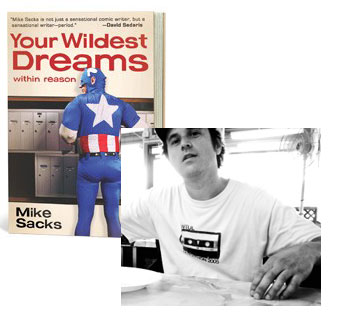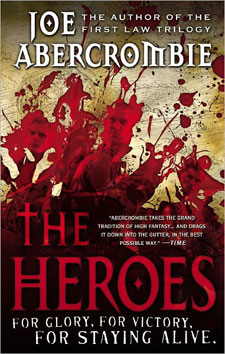Mike Sacks and His Naked Admiration

There’s a copy of Mike Sacks’ Your Wildest Dreams, Within Reason somewere in this apartment, and if I could track it down I would quote for you verbatim from the piece within it that had me laughing out loud on the 7 train, especially since it was about the 7 train, at least glancingly. Oh, wait, that particular joke is online: “Kama Sutra: The Corrections.” (Note: Totally NSFW, which made reading it on a rush-hour subway train a bit of a challenge; eventually, I flipped back to “The Rejection of Anne Frank,” which Sacks co-wrote with Teddy Wayne; it’s actually probably even more outrageous, but at least not visually so.) And then there’s “IKEA Instructions,” which just flat out reduces both me and my wife to tears of laughter… Anyway, suffice to say Mike Sacks is my type of humor, and in this essay, Sacks pays tribute to one of his favorite humorists.
David Sedaris is always mentioned by both readers and writers as being one of their favorite humorists, and for good reason. Technically, I find him one of the best writers currently working, in humor or any other genre. All of his books are top-notch, but for the sake of this mini-essay, I’m going to mostly concentrate on his 1996 book Naked. And I’m going to talk about two things that impress me about his writing: his endings and his dialogue.
First, endings. Sedaris is a master at creating endings that end on just that perfect note of pathos and optimism (not an easy combination). This ending is from his story “Ashes,†a beautiful piece about the loss of his mother:
“Our mother was back in her room and very much alive, probably watching a detective program on television. Maybe that was her light in the window, her figure stepping out onto the patio to light a cigarette. We told ourselves she probably wanted to be left alone, that’s how stoned we were. We’d think of this later, each in our own separate way. I myself tend to dwell on the stupidity of pacing a cemetery while she sat, frightened and alone, staring at the tip of her cigarette and envisioning her self, clearly now, in ashes.â€
I don’t know many writers, in any genre, who can end a story on such a darkly poetic note without sounding maudlin.
28 February 2011 | selling shorts |
Read This: The Heroes
 My latest review for Shelf Awareness is a look at Joe Abercrombie’s The Heroes, an epic fantasy novel that’s equal parts J.R.R. Tolkien and Steven Pressfield. Or, to paraphrase my own opening line, if Sam Fuller had ever made a sword epic, it would have looked a lot like this.
My latest review for Shelf Awareness is a look at Joe Abercrombie’s The Heroes, an epic fantasy novel that’s equal parts J.R.R. Tolkien and Steven Pressfield. Or, to paraphrase my own opening line, if Sam Fuller had ever made a sword epic, it would have looked a lot like this.
Like Fuller’s war movies, The Heroes is a profoundly unsentimental look at combat: Before the fight begins, (nearly) everybody jockeys for the position they think will bring them the most glory; once the swords come out, everyone just scrambles to stay alive. The particulars of this conflict are almost beside the point, although Abercrombie does do a fantastic job of outlining a complex political scenario underpinning the battle between the fragile alliance of chieftains under Black Dow and the advancing Army of the Union. As I suggest in my review, Abercrombie may be drawing on a lot of historical parallels here—in particular, I think American readers may find echoes of the Civil War—but the novel’s strength lies in the ability to create an entirely new reality out of those real-world influences. The Heroes depicts no war you’ve ever seen, but you will believe that this is how people like these characters would behave in circumstances like this—and that, to me, is a mark of truly great fiction.
25 February 2011 | read this |

 Our Endless and Proper Work is my new book with Belt Publishing about starting (and sticking to) a productive writing practice.
Our Endless and Proper Work is my new book with Belt Publishing about starting (and sticking to) a productive writing practice. 
